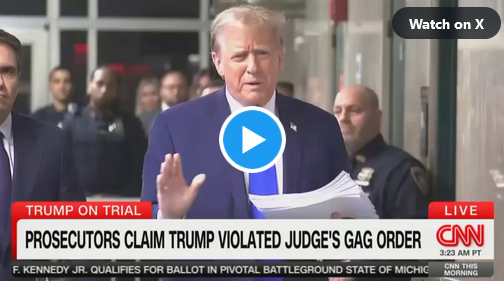House Democrats have introduced a bill that would take away the Secret Service’s protection from people who have been convicted of a crime and are in prison.
This is being called a direct attack on former President Trump, who is currently on trial in New York City for alleged ‘hush money’ payments made during the 2016 election campaign and faces other charges that could put him in jail.
Former chair of the now-disbanded Jan. 6 congressional committee, Rep. Bennie Thompson (D-MS) proposed a bill that would automatically take away Secret Service protection for people who have been convicted of a federal or state felony that carries a minimum one-year prison sentence.
The bill’s name is provocatively called the “Denying Infinite Security and Government Resources Allocated toward Convicted and Extremely Dishonorable (DISGRACED) Former Protectees Act.”
“Unfortunately, current law doesn’t anticipate how Secret Service protection would impact the felony prison sentence of a protectee—even a former President,” Thompson said in a statement.
“It is regrettable that it has come to this, but this previously unthought-of scenario could become our reality.”
Along with Thompson’s statement, there was a so-called “fact sheet” that said Trump is facing an “unprecedented 91 felony charges in federal and state courts.” This has “created a new exigency that Congress must address to ensure Secret Service protection does not interfere with the criminal judicial process and the administration of justice.”
On the one-pager, it says that the bill would apply to former President Trump if he is found guilty of a crime and to all Secret Service protectees who are found guilty and sentenced on felony charges.
Thompson’s proposal states that the current law doesn’t consider how Secret Service security would be given to a protected person who is in jail, which could make things harder for both the Secret Service and the prison officials.
Thompson argues that the proposed bill would keep the Secret Service from complicating matters if former President Trump is sent to jail.
“Therefore, it is necessary for us to be prepared and update the law so the American people can be assured that protective status does not translate into special treatment—and that those who are sentenced to prison will indeed serve the time required of them,” Thompson said.
It would also address legal arguments that if Trump were to be found guilty, he should be given home or modified confinement instead of going to prison because of his Secret Service protection.
“This bill would remove the potential for conflicting lines of authority within prisons and allow judges to weigh the sentencing of individuals without having to factor in the logistical concerns of convicts with Secret Service protection,” the document states.
The Secret Service protects the president and his or her family, as well as past presidents and other high-level officials. After Senator Robert F. Kennedy was killed in 1968, protection was extended to major party presidential nominees. However, his son RFK Jr. has not been given Secret Service security for his 2024 independent run.
On Friday, a CNN panel debated the expected fallout of Donald Trump being sent to jail due to violations of a ‘gag order’ during the 2024 presidential campaign.
CNN political analyst Mark Preston argued that jailing Trump would lead to widespread civil unrest.
“I think that if [Trump] does go into this hole, if that were to happen, first of all, I think you would probably see civil unrest across the country, certainly in some cities,” he said.
